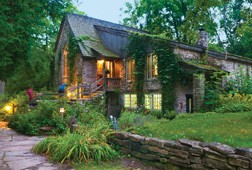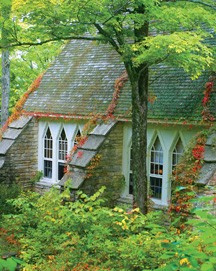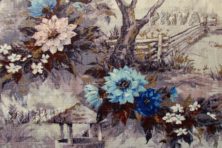A Loyal Following at The Clearing
- Share
- Tweet
- Pin
- Share

If you were to ask most any business owner “What’s your most valuable asset?” the answer would likely be “That’s easy. It’s our loyal customers.” This is certainly the case at The Clearing. Casual visitors might assume that the land itself, especially the long expanse of the Niagara Escarpment, is what’s most valuable at The Clearing. Some might suggest that it’s the historic buildings – the Lodge, Schoolhouse and cabins. A few might say that it’s our connection to Jens Jensen, a great man and visionary, who founded The Clearing in 1935 after a long and successful career in Chicago as a landscape architect and conservationist.
There’s really no doubt, though, about what’s most valuable at The Clearing: It’s the loyalty of those who take classes here, those who teach classes here and those who volunteer here. Their loyalty is by far the most important thing The Clearing “owns.” The longer one is involved here, whether as a member of the staff, a member of the board, a student, an instructor or a volunteer, the more evident it becomes that an exceptionally loyal following is the reason The Clearing has been around for 76 years, and is thriving in 2011.
I am, of course, biased in The Clearing’s favor. But I believe that The Clearing lives by – has always lived by – something more than the “treat the customer the way you want to be treated/bend over backwards for the customer/make the customer happy and they’ll come back” philosophy that guides most successful businesses. I believe The Clearing has something more, something unique, something that many people who come here describe as magical, something that makes people fall in love with this place and want to come back. What is it – this “thing” – that results in people becoming so loyal to The Clearing?
Well, as one might expect, it’s not just one thing. Instead, it’s a combination of physical and emotional “satisfaction” that people find so appealing about The Clearing. It will probably come as no surprise that food is one of them. Whether it’s the “homemade/fresh-baked/prepared and served by nice people” family-style meals eaten in the Lodge during weeklong classes from May through October, the catered lunches served during one and two-day workshops or the Friday night potluck suppers that are a tradition during The Clearing’s Winter Program, meal time is an important part of The Clearing experience – an important time for “community” to develop. That’s how it was in Jensen’s time, and that’s how it is today. So mealtime is one of the things people love about The Clearing and that keeps them coming back.

During weeklong classes and winter potluck suppers, each meal is preceded by a short reading or poem. This tradition dates back to Jensen’s time at The Clearing and, along with other time-honored traditions, connects the past with the present – connects those at The Clearing today with those who built and cared for this place over the past seven decades. Tradition, then, plays an important role in the love and loyalty people have for The Clearing.
The folk school “way” is another factor. The informal, no-pressure style in which classes are taught puts people at ease. Jens Jensen attended a folk high school in his native Denmark, where the “living word,” the “work of the hand” and close contact with the native landscape were the basic principals of education. He built The Clearing based upon these same principals, and they have much to do with people being drawn back to The Clearing again and again. So the folk school philosophy is yet another reason people are so loyal to The Clearing.
The community that develops within each Clearing class, especially during weeklong classes from spring through fall, is another unique aspect of The Clearing experience, and certainly one of the things people love most. Many develop life-long friendships while at The Clearing. People who are guarded on Sunday evening are at ease by Monday night. People feel safe at The Clearing, whether walking alone in the woods or knowing that they can be themselves. So the sense of community that develops in each class and during each week at The Clearing helps build loyalty among students and instructors.
The retreat atmosphere that exists during weeklong classes sets The Clearing apart from most other adult education experiences, and it’s certainly something students and instructors love most about The Clearing. From Sunday evening through Saturday morning, the property is closed to visitors (except for the visitor center on Garrett Bay Road) in order to maintain privacy and solitude. There are no televisions or radios. Students and instructors are encouraged to keep the use of cell phones and other hand-held digital devices to a minimum. The retreat atmosphere, therefore, plays a major role in bringing people back to The Clearing.

And, yes, The Clearing’s physical setting is exceptional and has much to do with people falling in love with the place and coming back year after year. Jensen chose this property because it met the four criteria for which he was looking: a place at the edge of the wild, high on a bluff or hill, looking out over water, with a view of the setting sun. Several places in the upper Midwest fit the bill, but none was as good a fit as Door County, in particular this little piece of Door County near Ellison Bay. So the physical place – the woods, the meadows, the shoreline, the winding paths, the stone and log buildings, the wind in the trees, the gorgeous sunsets over water, the star-filled night sky, the wildflowers – draws people back like an old friend.
The food and meals, the traditions and history, the classes, the community, the retreat atmosphere and the land itself – these things combine to make The Clearing the kind of place people return to again and again. You can’t put a price tag on this kind of loyalty, but it’s safe to say that there’s nothing more valuable at The Clearing.
Peninsula Arts and Humanities Alliance, Inc., is a coalition of non-profit organizations whose purpose is to enhance, promote and advocate the arts, humanities and natural sciences in Door County.

